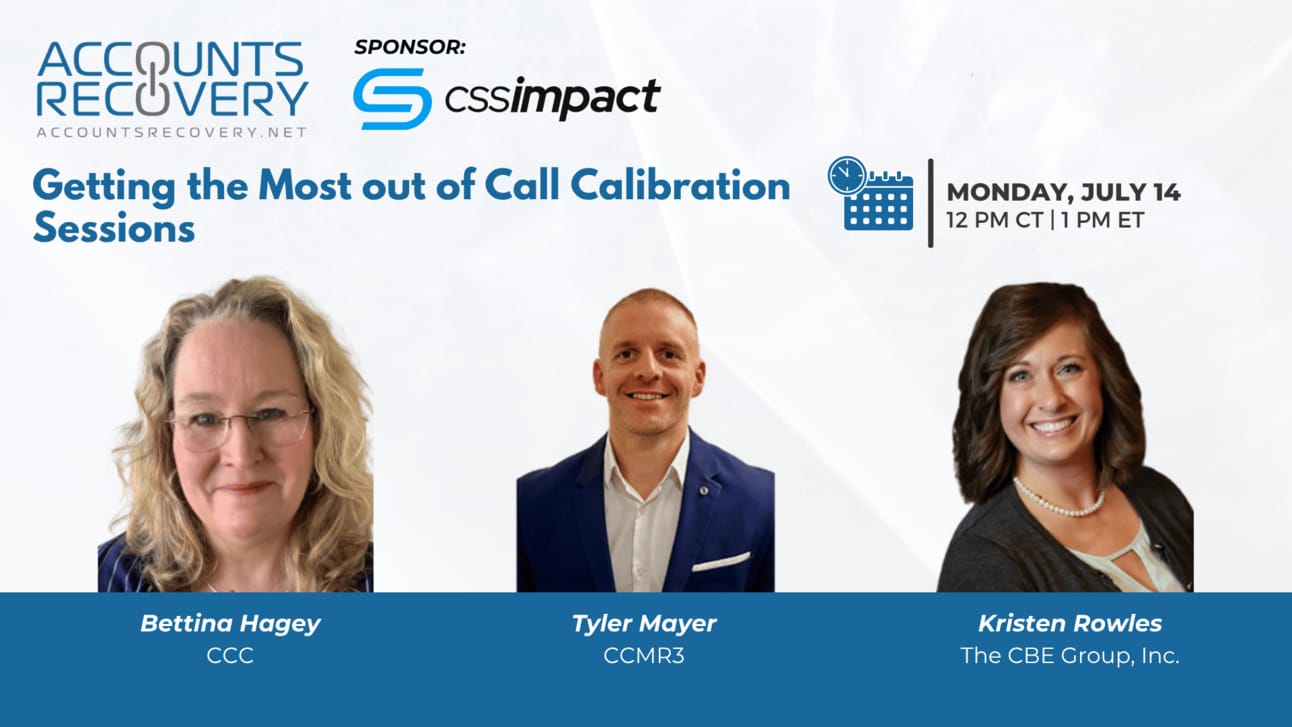- AccountsRecovery Daily Digest
- Posts
- Daily Digest - July 15, 2025
Daily Digest - July 15, 2025
Brought to you by: TCN | By Mike Gibb

🥳 🎂 Happy belated Birthday to Dennis Barton of The Barton Law Group and John Bedard of The Bedard Law Group, who both celebrated their special days yesterday. Happy Birthday to: David Ravin of Harvest Strategy Group, Benjamin Benson of Ratchford Law Group, and Emily Barnard of ABC Legal Services.
🙌 🎉 Congratulations to: Kimberlie Cline, the new Senior Director of Business Operations at CACi, Robin Ivie-Wilder, the new Director of Creditor Relationships at Credit Associates, and Katy Repholz, the new Network Operations Associate at Kredit.
📆 Going to ACA next week in Louisville? Want to sit down and chat? Let me know!
More than 35 speakers have confirmed for ComplianceCon. Check out who will be speaking and more at Compliance-Con.com.
Plaintiff Sues Collection Operations for Attempting to Collect After Refusal to Pay Email
An individual has filed lawsuits against two different collection operations for allegedly violating the Fair Debt Collection Practices Act by attempting to collect a debt after the individual communicated a refusal to pay. Coincidentally, the collection operations both responded within hours to the individual’s refusal to pay message, which was also sent via email. One of the defendants inquired about whether the plaintiff would be eligible for financial assistance and the other offered “customizable payment options.” What are the odds?
This series is sponsored by WebRecon

A MESSAGE FROM TCN
TODAY‘S WEBINAR
UPCOMING WEBINARS
Senate Dems Blast CFPB for Siding With Industry on Medical Debt
Following Friday’s ruling vacating the Consumer Financial Protection Bureau’s medical debt credit reporting rule, a coalition of 30 Democratic senators, led by Senator Raphael Warnock [D-Ga.], is demanding transparency from the Trump administration following the CFPB”s decision to join the defendants in the lawsuit and advocate for vacating the rule.
Granted MTD in FDCPA, TCPA Case Leads to Second Amended Complaint Against Creditor
A District Court judge in Arizona has granted a defendant’s motion to dismiss claims it violated the Fair Debt Collection Practices Act and the Telephone Consumer Protection Act, leading the plaintiffs to file a second amended complaint further detailing the alleged infractions committed by the defendant, a financial institution.
Industry to Dismiss Suit Against CFPB Over Medical Debt Collection Guidance
The plaintiffs challenging medical debt collection guidance from the Consumer Financial Protection Bureau plan to dismiss their suit after hearing that the Bureau has no plans to reissue the guidance.
WORTH NOTING: You may want to think twice before using a Large Language Model like ChatGPT for therapy or mental health advice ... Regardless of what happens with interest rates, most people aren't interested in moving or buying a new house ... The cost of prescription drugs is leading a lot of people to just say no ... To the surprise of absolutely nobody, nearly all seniors want to age in place ... The states where people report having the most "good" days every year will likely surprise you like it surprised me ... The cost of electricity is going to skyrocket thanks to new legislation ... Rumors are ramping up that Nick Saban is coming back to college football ... The four words that your doctor dreads hearing.
Trailer Tuesday, part I
Trailer Tuesday, Part II
Webinar Recap: Getting the Most out of Call Calibration Sessions

Call calibration sessions are more than just quality assurance—they’re a foundational tool for coaching, training, and aligning performance across contact and collection operations. In a recent webinar sponsored by CSS Impact, a panel of industry leaders discussed how calibration sessions can unify teams, build stronger client relationships, and improve agent performance.
Panelists emphasized that call calibration is about much more than grading a call. It’s about ensuring consistency across QA staff, supervisors, and clients, aligning on the definition of quality, and empowering agents through structured feedback and self-discovery. From building objective scorecards to adapting processes to account for increased digital communications, panelists shared tips to make calibration sessions more engaging, impactful, and aligned with organizational goals.
Key Takeaways:
Consistency Drives Confidence
Regular calibration sessions help ensure that everyone evaluating calls—QA, supervisors, and clients—is on the same page. This alignment builds credibility and helps reinforce a consistent brand and communication style across all agents.Use Technology to Enhance (Not Replace) Coaching
Speech analytics and AI tools can reduce the time it takes to find teachable calls and identify trends. But human coaching remains critical—calibration sessions allow teams to interpret analytics meaningfully and apply lessons to real interactions.Make Feedback Part of the Culture
Encourage agents to participate in the process, including identifying calls for review. This builds psychological safety, encourages self-reflection, and normalizes feedback as a growth tool—not a punishment.
Action Item:
Start small. Host a calibration session with QA and team leads. Listen to one call together, compare scores, and discuss the rationale behind each decision. Use this as a launching point to scale a standardized, collaborative approach across your organization.
Webinar Recap: Is the CFPB's Medical Debt Credit Reporting Rule Finally Dead?

A recent federal court ruling has upended the CFPB’s attempt to ban medical debt from appearing on consumer credit reports — and the implications are wide-reaching. In a special webinar hosted by AccountsRecovery.net and sponsored by Connect International, panelists Leslie Bender of Eversheds Sutherland and Dan Smith of the Consumer Data Industry Association (CDIA) unpacked the decision and discussed what comes next for the industry.
The court ruled that the CFPB exceeded its authority under the Fair Credit Reporting Act (FCRA) when it attempted to implement a ban on medical debt reporting. The judge not only vacated the rule but also issued a sweeping opinion supporting the arguments made by CDIA and co-plaintiffs — including a notable finding that any state laws attempting to prohibit the reporting of medical debt may be preempted by federal law.
Panelists also emphasized that the credit reporting system is voluntary and governed by clearly defined congressional statutes. Regulatory agencies and state legislatures, they argued, cannot rewrite or ignore those statutes to advance policy preferences.
3 Key Takeaways:
Medical debt reporting is still allowed: The court vacated the CFPB’s ban, and no immediate changes are required of furnishers. Companies can continue reporting medical debt, though they should consult with CRAs for guidance.
Preemption is now in play: The ruling bolsters arguments that state-level bans on medical debt reporting may be invalid under the FCRA, setting the stage for potential litigation in multiple jurisdictions.
Expect more legal challenges: CDIA and others are evaluating next steps, including whether to challenge the growing number of state laws restricting medical debt reporting, citing harm to the integrity of credit files and the overall ecosystem.
As the situation develops, CDIA is urging furnishers and industry stakeholders to stay engaged, seek training, and prepare for additional legal activity in 2025 and beyond.
The Daily Digest is sponsored by TCN






